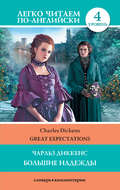
Чарльз Диккенс
Sketches of Young Couples
THE NICE LITTLE COUPLE
A custom once prevailed in old-fashioned circles, that when a lady or gentleman was unable to sing a song, he or she should enliven the company with a story. As we find ourself in the predicament of not being able to describe (to our own satisfaction) nice little couples in the abstract, we purpose telling in this place a little story about a nice little couple of our acquaintance.
Mr. and Mrs. Chirrup are the nice little couple in question. Mr. Chirrup has the smartness, and something of the brisk, quick manner of a small bird. Mrs. Chirrup is the prettiest of all little women, and has the prettiest little figure conceivable. She has the neatest little foot, and the softest little voice, and the pleasantest little smile, and the tidiest little curls, and the brightest little eyes, and the quietest little manner, and is, in short, altogether one of the most engaging of all little women, dead or alive. She is a condensation of all the domestic virtues, – a pocket edition of the young man’s best companion, – a little woman at a very high pressure, with an amazing quantity of goodness and usefulness in an exceedingly small space. Little as she is, Mrs. Chirrup might furnish forth matter for the moral equipment of a score of housewives, six feet high in their stockings – if, in the presence of ladies, we may be allowed the expression – and of corresponding robustness.
Nobody knows all this better than Mr. Chirrup, though he rather takes on that he don’t. Accordingly he is very proud of his better-half, and evidently considers himself, as all other people consider him, rather fortunate in having her to wife. We say evidently, because Mr. Chirrup is a warm-hearted little fellow; and if you catch his eye when he has been slyly glancing at Mrs. Chirrup in company, there is a certain complacent twinkle in it, accompanied, perhaps, by a half-expressed toss of the head, which as clearly indicates what has been passing in his mind as if he had put it into words, and shouted it out through a speaking-trumpet. Moreover, Mr. Chirrup has a particularly mild and bird-like manner of calling Mrs. Chirrup ‘my dear;’ and – for he is of a jocose turn – of cutting little witticisms upon her, and making her the subject of various harmless pleasantries, which nobody enjoys more thoroughly than Mrs. Chirrup herself. Mr. Chirrup, too, now and then affects to deplore his bachelor-days, and to bemoan (with a marvellously contented and smirking face) the loss of his freedom, and the sorrow of his heart at having been taken captive by Mrs. Chirrup – all of which circumstances combine to show the secret triumph and satisfaction of Mr. Chirrup’s soul.
We have already had occasion to observe that Mrs. Chirrup is an incomparable housewife. In all the arts of domestic arrangement and management, in all the mysteries of confectionery-making, pickling, and preserving, never was such a thorough adept as that nice little body. She is, besides, a cunning worker in muslin and fine linen, and a special hand at marketing to the very best advantage. But if there be one branch of housekeeping in which she excels to an utterly unparalleled and unprecedented extent, it is in the important one of carving. A roast goose is universally allowed to be the great stumbling-block in the way of young aspirants to perfection in this department of science; many promising carvers, beginning with legs of mutton, and preserving a good reputation through fillets of veal, sirloins of beef, quarters of lamb, fowls, and even ducks, have sunk before a roast goose, and lost caste and character for ever. To Mrs. Chirrup the resolving a goose into its smallest component parts is a pleasant pastime – a practical joke – a thing to be done in a minute or so, without the smallest interruption to the conversation of the time. No handing the dish over to an unfortunate man upon her right or left, no wild sharpening of the knife, no hacking and sawing at an unruly joint, no noise, no splash, no heat, no leaving off in despair; all is confidence and cheerfulness. The dish is set upon the table, the cover is removed; for an instant, and only an instant, you observe that Mrs. Chirrup’s attention is distracted; she smiles, but heareth not. You proceed with your story; meanwhile the glittering knife is slowly upraised, both Mrs. Chirrup’s wrists are slightly but not ungracefully agitated, she compresses her lips for an instant, then breaks into a smile, and all is over. The legs of the bird slide gently down into a pool of gravy, the wings seem to melt from the body, the breast separates into a row of juicy slices, the smaller and more complicated parts of his anatomy are perfectly developed, a cavern of stuffing is revealed, and the goose is gone!
To dine with Mr. and Mrs. Chirrup is one of the pleasantest things in the world. Mr. Chirrup has a bachelor friend, who lived with him in his own days of single blessedness, and to whom he is mightily attached. Contrary to the usual custom, this bachelor friend is no less a friend of Mrs. Chirrup’s, and, consequently, whenever you dine with Mr. and Mrs. Chirrup, you meet the bachelor friend. It would put any reasonably-conditioned mortal into good-humour to observe the entire unanimity which subsists between these three; but there is a quiet welcome dimpling in Mrs. Chirrup’s face, a bustling hospitality oozing as it were out of the waistcoat-pockets of Mr. Chirrup, and a patronising enjoyment of their cordiality and satisfaction on the part of the bachelor friend, which is quite delightful. On these occasions Mr. Chirrup usually takes an opportunity of rallying the friend on being single, and the friend retorts on Mr. Chirrup for being married, at which moments some single young ladies present are like to die of laughter; and we have more than once observed them bestow looks upon the friend, which convinces us that his position is by no means a safe one, as, indeed, we hold no bachelor’s to be who visits married friends and cracks jokes on wedlock, for certain it is that such men walk among traps and nets and pitfalls innumerable, and often find themselves down upon their knees at the altar rails, taking M. or N. for their wedded wives, before they know anything about the matter.
However, this is no business of Mr. Chirrup’s, who talks, and laughs, and drinks his wine, and laughs again, and talks more, until it is time to repair to the drawing-room, where, coffee served and over, Mrs. Chirrup prepares for a round game, by sorting the nicest possible little fish into the nicest possible little pools, and calling Mr. Chirrup to assist her, which Mr. Chirrup does. As they stand side by side, you find that Mr. Chirrup is the least possible shadow of a shade taller than Mrs. Chirrup, and that they are the neatest and best-matched little couple that can be, which the chances are ten to one against your observing with such effect at any other time, unless you see them in the street arm-in-arm, or meet them some rainy day trotting along under a very small umbrella. The round game (at which Mr. Chirrup is the merriest of the party) being done and over, in course of time a nice little tray appears, on which is a nice little supper; and when that is finished likewise, and you have said ‘Good night,’ you find yourself repeating a dozen times, as you ride home, that there never was such a nice little couple as Mr. and Mrs. Chirrup.
Whether it is that pleasant qualities, being packed more closely in small bodies than in large, come more readily to hand than when they are diffused over a wider space, and have to be gathered together for use, we don’t know, but as a general rule, – strengthened like all other rules by its exceptions, – we hold that little people are sprightly and good-natured. The more sprightly and good-natured people we have, the better; therefore, let us wish well to all nice little couples, and hope that they may increase and multiply.
THE EGOTISTICAL COUPLE
Egotism in couples is of two kinds. – It is our purpose to show this by two examples.
The egotistical couple may be young, old, middle-aged, well to do, or ill to do; they may have a small family, a large family, or no family at all. There is no outward sign by which an egotistical couple may be known and avoided. They come upon you unawares; there is no guarding against them. No man can of himself be forewarned or forearmed against an egotistical couple.
The egotistical couple have undergone every calamity, and experienced every pleasurable and painful sensation of which our nature is susceptible. You cannot by possibility tell the egotistical couple anything they don’t know, or describe to them anything they have not felt. They have been everything but dead. Sometimes we are tempted to wish they had been even that, but only in our uncharitable moments, which are few and far between.
We happened the other day, in the course of a morning call, to encounter an egotistical couple, nor were we suffered to remain long in ignorance of the fact, for our very first inquiry of the lady of the house brought them into active and vigorous operation. The inquiry was of course touching the lady’s health, and the answer happened to be, that she had not been very well. ‘Oh, my dear!’ said the egotistical lady, ‘don’t talk of not being well. We have been in such a state since we saw you last!’ – The lady of the house happening to remark that her lord had not been well either, the egotistical gentleman struck in: ‘Never let Briggs complain of not being well – never let Briggs complain, my dear Mrs. Briggs, after what I have undergone within these six weeks. He doesn’t know what it is to be ill, he hasn’t the least idea of it; not the faintest conception.’ – ‘My dear,’ interposed his wife smiling, ‘you talk as if it were almost a crime in Mr. Briggs not to have been as ill as we have been, instead of feeling thankful to Providence that both he and our dear Mrs. Briggs are in such blissful ignorance of real suffering.’ – ‘My love,’ returned the egotistical gentleman, in a low and pious voice, ‘you mistake me; – I feel grateful – very grateful. I trust our friends may never purchase their experience as dearly as we have bought ours; I hope they never may!’
Having put down Mrs. Briggs upon this theme, and settled the question thus, the egotistical gentleman turned to us, and, after a few preliminary remarks, all tending towards and leading up to the point he had in his mind, inquired if we happened to be acquainted with the Dowager Lady Snorflerer. On our replying in the negative, he presumed we had often met Lord Slang, or beyond all doubt, that we were on intimate terms with Sir Chipkins Glogwog. Finding that we were equally unable to lay claim to either of these distinctions, he expressed great astonishment, and turning to his wife with a retrospective smile, inquired who it was that had told that capital story about the mashed potatoes. ‘Who, my dear?’ returned the egotistical lady, ‘why Sir Chipkins, of course; how can you ask! Don’t you remember his applying it to our cook, and saying that you and I were so like the Prince and Princess, that he could almost have sworn we were they?’ ‘To be sure, I remember that,’ said the egotistical gentleman, ‘but are you quite certain that didn’t apply to the other anecdote about the Emperor of Austria and the pump?’ ‘Upon my word then, I think it did,’ replied his wife. ‘To be sure it did,’ said the egotistical gentleman, ‘it was Slang’s story, I remember now, perfectly.’ However, it turned out, a few seconds afterwards, that the egotistical gentleman’s memory was rather treacherous, as he began to have a misgiving that the story had been told by the Dowager Lady Snorflerer the very last time they dined there; but there appearing, on further consideration, strong circumstantial evidence tending to show that this couldn’t be, inasmuch as the Dowager Lady Snorflerer had been, on the occasion in question, wholly engrossed by the egotistical lady, the egotistical gentleman recanted this opinion; and after laying the story at the doors of a great many great people, happily left it at last with the Duke of Scuttlewig: – observing that it was not extraordinary he had forgotten his Grace hitherto, as it often happened that the names of those with whom we were upon the most familiar footing were the very last to present themselves to our thoughts.
It not only appeared that the egotistical couple knew everybody, but that scarcely any event of importance or notoriety had occurred for many years with which they had not been in some way or other connected. Thus we learned that when the well-known attempt upon the life of George the Third was made by Hatfield in Drury Lane theatre, the egotistical gentleman’s grandfather sat upon his right hand and was the first man who collared him; and that the egotistical lady’s aunt, sitting within a few boxes of the royal party, was the only person in the audience who heard his Majesty exclaim, ‘Charlotte, Charlotte, don’t be frightened, don’t be frightened; they’re letting off squibs, they’re letting off squibs.’ When the fire broke out, which ended in the destruction of the two Houses of Parliament, the egotistical couple, being at the time at a drawing-room window on Blackheath, then and there simultaneously exclaimed, to the astonishment of a whole party – ‘It’s the House of Lords!’ Nor was this a solitary instance of their peculiar discernment, for chancing to be (as by a comparison of dates and circumstances they afterwards found) in the same omnibus with Mr. Greenacre, when he carried his victim’s head about town in a blue bag, they both remarked a singular twitching in the muscles of his countenance; and walking down Fish Street Hill, a few weeks since, the egotistical gentleman said to his lady – slightly casting up his eyes to the top of the Monument – ‘There’s a boy up there, my dear, reading a Bible. It’s very strange. I don’t like it. – In five seconds afterwards, Sir,’ says the egotistical gentleman, bringing his hands together with one violent clap – ‘the lad was over!’
Diversifying these topics by the introduction of many others of the same kind, and entertaining us between whiles with a minute account of what weather and diet agreed with them, and what weather and diet disagreed with them, and at what time they usually got up, and at what time went to bed, with many other particulars of their domestic economy too numerous to mention; the egotistical couple at length took their leave, and afforded us an opportunity of doing the same.
Mr. and Mrs. Sliverstone are an egotistical couple of another class, for all the lady’s egotism is about her husband, and all the gentleman’s about his wife. For example: – Mr. Sliverstone is a clerical gentleman, and occasionally writes sermons, as clerical gentlemen do. If you happen to obtain admission at the street-door while he is so engaged, Mrs. Sliverstone appears on tip-toe, and speaking in a solemn whisper, as if there were at least three or four particular friends up-stairs, all upon the point of death, implores you to be very silent, for Mr. Sliverstone is composing, and she need not say how very important it is that he should not be disturbed. Unwilling to interrupt anything so serious, you hasten to withdraw, with many apologies; but this Mrs. Sliverstone will by no means allow, observing, that she knows you would like to see him, as it is very natural you should, and that she is determined to make a trial for you, as you are a great favourite. So you are led up-stairs – still on tip-toe – to the door of a little back room, in which, as the lady informs you in a whisper, Mr. Sliverstone always writes. No answer being returned to a couple of soft taps, the lady opens the door, and there, sure enough, is Mr. Sliverstone, with dishevelled hair, powdering away with pen, ink, and paper, at a rate which, if he has any power of sustaining it, would settle the longest sermon in no time. At first he is too much absorbed to be roused by this intrusion; but presently looking up, says faintly, ‘Ah!’ and pointing to his desk with a weary and languid smile, extends his hand, and hopes you’ll forgive him. Then Mrs. Sliverstone sits down beside him, and taking his hand in hers, tells you how that Mr. Sliverstone has been shut up there ever since nine o’clock in the morning, (it is by this time twelve at noon,) and how she knows it cannot be good for his health, and is very uneasy about it. Unto this Mr. Sliverstone replies firmly, that ‘It must be done;’ which agonizes Mrs. Sliverstone still more, and she goes on to tell you that such were Mr. Sliverstone’s labours last week – what with the buryings, marryings, churchings, christenings, and all together, – that when he was going up the pulpit stairs on Sunday evening, he was obliged to hold on by the rails, or he would certainly have fallen over into his own pew. Mr. Sliverstone, who has been listening and smiling meekly, says, ‘Not quite so bad as that, not quite so bad!’ he admits though, on cross-examination, that he was very near falling upon the verger who was following him up to bolt the door; but adds, that it was his duty as a Christian to fall upon him, if need were, and that he, Mr. Sliverstone, and (possibly the verger too) ought to glory in it.
This sentiment communicates new impulse to Mrs. Sliverstone, who launches into new praises of Mr. Sliverstone’s worth and excellence, to which he listens in the same meek silence, save when he puts in a word of self-denial relative to some question of fact, as – ‘Not seventy-two christenings that week, my dear. Only seventy-one, only seventy-one.’ At length his lady has quite concluded, and then he says, Why should he repine, why should he give way, why should he suffer his heart to sink within him? Is it he alone who toils and suffers? What has she gone through, he should like to know? What does she go through every day for him and for society?
With such an exordium Mr. Sliverstone launches out into glowing praises of the conduct of Mrs. Sliverstone in the production of eight young children, and the subsequent rearing and fostering of the same; and thus the husband magnifies the wife, and the wife the husband.
This would be well enough if Mr. and Mrs. Sliverstone kept it to themselves, or even to themselves and a friend or two; but they do not. The more hearers they have, the more egotistical the couple become, and the more anxious they are to make believers in their merits. Perhaps this is the worst kind of egotism. It has not even the poor excuse of being spontaneous, but is the result of a deliberate system and malice aforethought. Mere empty-headed conceit excites our pity, but ostentatious hypocrisy awakens our disgust.







